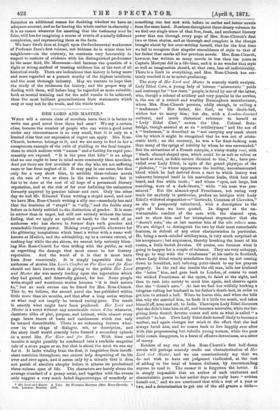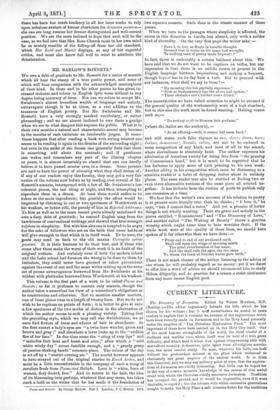HER LORD AND MASTER.*
WHEN will a certain class of novelists learn that it is better to write one good novel than three bad ones ? We say a certain class, because the number of people who can write a good novel under any circumstances is so very small, that it is only to a limited class that our expression of regret can apply. Mrs. Ross- Church, however, belongs to it, and we are sorry to find in her a conspicuous example of the evils of yielding to the fatal tempta- tions to which authors with " names " and a facility for rapid pen- manship are exposed. " It is the pace that kills " is an adage that no one ought to bear in mind more constantly than novelists. And yet there are few novelists of the day who are not suffering more or less from neglect of it. It may pay in one sense, but that only for a very short time, to scribble three-volume novels at the rate of two or three in the twelve months ; but it has to be done at the cost of all hope of a permanent literary reputation, and at the risk of for ever forfeiting the estimation formerly acquired by genuine labour and care. Only the other day we had Mr. Edmund Yates writing a stupid novel, and now we have Mrs. Ross-Church writing a silly one—somebody has said that the feminine of " stupid " is "silly," and the feeble story before us is fairly entitled to the distinction of gender. It is more in sorrow than in anger, but still not entirely without the latter feeling, that we apply an epithet so harsh to the work of an authoress who has shown in former days such genuine and remarkable literary power. Making every possible allowance for the glittering temptations which beset a writer with a name well known at Mudie's, and the advisability, up to a certain extent, of making hay while the sun shines, we cannot help seriously blam- ing Mrs. Ross-Church for thus trifling with the public, as well as regretting the damage that must ensue to her literary reputation. And the worst of it is that it must have been done consciously. It is simply impossible that the -authoress of stories like Love's Conflict or For Ever and for Ever should not have known that in giving to the public Her Lord and Master she was merely trading upon the reputation which they had gained, and deservedly gained, for her. Some people write stupid and wearisome stories because " it is their nature to," but no such excuse can be found for Mrs. Rosa-Church. This is, we believe, the second novel she has published within little more than six months, and that after a long series written at what may not inaptly be termed racing-pace. The result is exactly what might have been predicted. Her Lord and Master is a novel without any conceivable raison d'itre whatever, ,destitute alike of plot, purpose, and interest, while almost every page bears traces of haste and carelessness which can only be termed discreditable. There is no redeeming feature what- ever in the shape of dialogue, wit, or description, and the story itself would scarcely have formed a secondary episode in a novel like For Ever and for Ever. With time and trouble it might possibly be condensed into a readable magazine tale of a score pages or so, but that is about the most we can say for it. It lacks vitality from the first, it languishes from insuffi- cient nutrition throughout, one cannot help despairing of its life over and over again, and it seems only by a miracle that it does not perish of absolute atrophy before it attains its predestined three-volume span of life. The characters are barely above the average standard of a penny serial, and together with the events only suggest a very much faded daguerreotype of somebody or • Her Lord and Master. A Tale. By Florence Idarryat (Mrs. Boss-Church). 8 vols. London: Bentley. 1871.
something one has met with before in earlier and better novels from the same hand. Nowhere throughout three dreary volumes do we find one single trace of that free, fresh, and exuberant literary power that ran through every page of Mrs. Ross-Church's first two or three stories, and so thorough and complete is the change brought about by her over-writing herself, that for the first time we fail to recognize that singular resemblance of style to that of her father that marks all her previous novels. Mrs. Ross-Church, however, has written as many novels in less than ten years as Captain Marryat did in a life-time, and it is no wonder that style as well as imagination should, at that rate, lose all individuality. There is a limit in everything, and Mrs. Ross-Church has cer- tainly reached it as to novel-producing.
The story of Her Lord and Master is scarcely worth analysis. Lady Ethel Carr, a young lady of intense " aristocratic " pride
and contempt for " low-born " people, is loved by one of the latter, who, though a colonel of artillery and very popular in the service, is the son of a retired and wealthy Birmingham manufacturer, whom Mrs. Ross-Church persists, oddly enough, in calling a " tradesman." Her father, the Earl, on his death-bed, wishes her to marry him ; but she, with a London-Journal outburst, and mach rhetorical reference to herself as " Lady Ethel Carr," scorns the idea. Colonel Bain- bridge, though sneered at as an " artilleryman" and the son of a " tradesman," is described as " not carrying any mark about him by which it might be recognized that he was not of aristo- cratic birth ; on the contrary, he was a far finer-looking man than many of the sprigs of nobility by whom he was surrounded." But the attractions of a French marquis, a wishy-washy roué, with " black, almond-shaped eyes, which could be as soft as velvet or as hard as steel, as fickle nature dictated to him," &c., have pre- vailed over Lady Ethel, in spite of the grand physique of the " plebeian," " in whose appearance the healthy, uncontaminated blood which he had derived from a race to which luxury was unknown betrayed itself in his marvellous limbs, thick hair and beard, and fine white teeth ; " and whose " eyes, not large, but searching, were of a dark-brown," while " his nose was pro- minent." But the almond-eyed Frenchman, not caring very much for anybody in particular, prefers an intrigue with Lady Ethers widowed stepmother—" Gertrude, Countess of Cleveden," as she is pompously introduced, with a description in the style of those we have quoted. In disgust at the un- warrantable conduct of the man with the almond eyes, and to show him and her triumphant stepmother that she "doesn't care," she at last marries him of the alto relievo nose. We are obliged to distinguish the two by their most remarkable features, in default of any other characteristics in particular. He, being a meek-minded artilleryman, is very much surprised at his acceptance ; but acquiesces, thereby breaking the heart of his cousin, a little Scotch devotee. Of course, one foresees what is going to happen for a couple of volumes. They are very unhappy, they go to stay with the " tradesman" at his castle in Scotland, where Lady Ethel utterly scandalizes the old man by not coming down to breakfast, and refusing point-blank to say her prayers properly. In the Send she insults the old man, tells her husband she " hates " him, and goes back to London, of course to meet the wicked Frenchman at the opera, to faint at the sight, and then to rush into society to meet him again, and observe again that she " doesn't care." At last we find her wilfully burking a telegram calling her husband to his father's death-bed, in order to get him to attend a ball. When he learns this, and when she tells him why she married him, he finds it a little too much, and takes himself off, nose and all, to India. Thereupon Lady Ethel discovers that she didn't hate him at all, and becomes miserable, while the for- giving little Scotch devotee comes and acts as what is called " a comfort " to her. Then Lady Ethel finds herself likely to become a mother, and again changes her mind to the effect that she had always loved him, and he comes back to live happily ever after with this prepossessing but volatile young woman, while the poor little cousin disappears, in a burst of effusive devoutness, as a sister of mercy.
Readers of any one of Mrs. Ross-Church's first half-dozen novels will perhaps scarcely credit our characterization of Her Lord and Master, and we can conscientiously say that we do not wish to have our judgment vindicated, at the cost of adding to the total of human dullness, by recommending anyone to read it. The sooner it is forgotten the better. It is simply impossible that an author of such exuberant and characteristic power in her earlier days can really have " written herself out," and we are convinced that with a rest of a year or two, and a determination to get out of the old groove a little-
there has been too much tendency in all her later works to rely upon nebulous avatars of former characters for dramatis personw- she can ere long resume her former distinguished and well-earned position. We are the more inclined to hope that such will be the case, as we feel sure that Mrs. Ross-Church must in her own mind be as acutely sensible of the falling-off from her old standard, which Her Lord and Master displays, as any of her regretful critics, and must also know full well to what to attribute the deterioration.



































 Previous page
Previous page